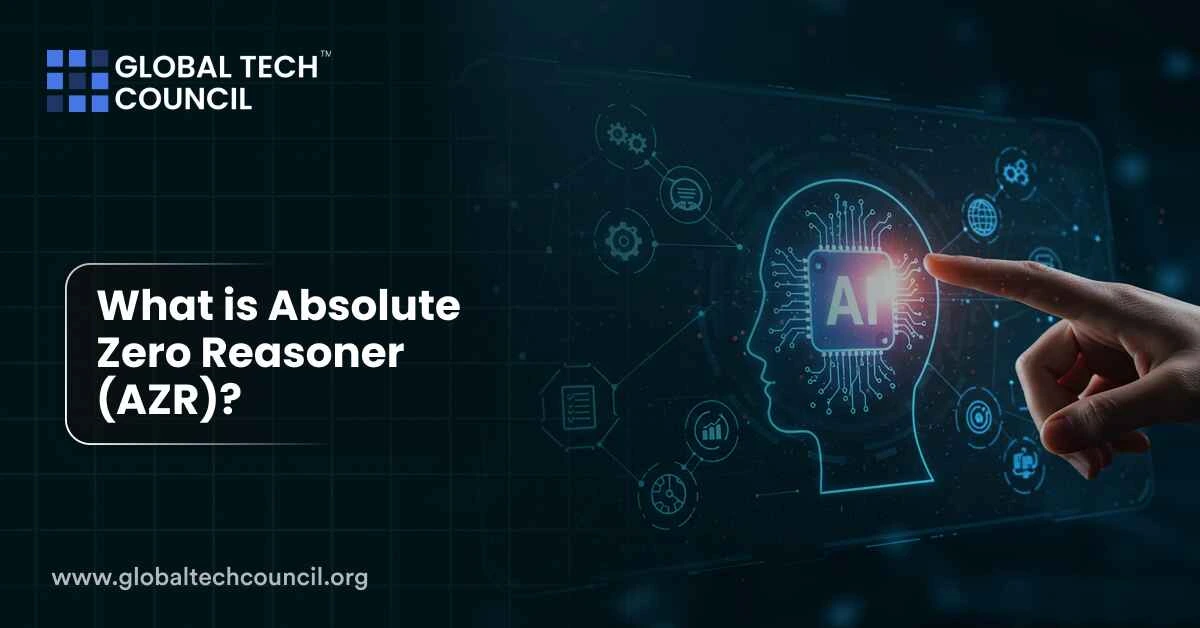
Absolute Zero Reasoner (AZR) is an advanced AI training framework that allows models to generate, verify, and solve their own reasoning tasks—without relying on human-labeled data. In other words, AZR lets AI systems design their own challenges, solve them, and learn from the process. This makes AZR a highly autonomous, scalable, and efficient way to build smarter AI models—especially in coding and math tasks.
In this article, you’ll learn exactly how AZR works, what makes it stand out compared to other training approaches, its main advantages and limitations, and how professionals can leverage this technology to stay ahead in the AI field.
How AZR Works
AZR follows a four-step cycle that enables it to train itself:
1. Propose
The model generates a new task, like a coding exercise or a math problem, based on its current knowledge level.
2. Verify
A built-in code executor checks whether the task is valid and solvable. Invalid or nonsensical tasks are discarded.
3. Solve
The model attempts to solve the task it created, applying its own reasoning capabilities.
4. Learn
If the solution passes verification, the model rewards itself and adjusts its parameters to improve future performance.
This self-sufficient loop allows AZR to continuously train without waiting for human-annotated data, making it highly efficient and adaptable.
AZR vs Traditional Learning Methods
AZR’s biggest advantage is that it doesn’t depend on pre-labeled data. Traditional AI models often require massive datasets that are time-consuming and expensive to collect and annotate. AZR bypasses this by generating and verifying its own tasks, enabling faster learning and adaptability.
Here’s how AZR compares to other training approaches:
| Feature | AZR | Traditional AI |
| Data Source | Self-generated tasks | Human-labeled datasets |
| Verification | Built-in code executor | Human reviewers |
| Scalability | High, adaptable to all sizes | Limited by data availability |
| Learning Style | Self-play learning loop | Supervised or RL-based |
| Best Applications | Coding, math, logic tasks | Varies by application |
This approach makes AZR particularly powerful for technical tasks that require precision and objective solutions.
AZR Benchmark Results by Model Size
AZR has demonstrated strong performance across different model sizes, proving its scalability:
| Model Size (Billion Parameters) | Performance Highlights |
| 3B | Outperforms many small supervised models |
| 7B | Matches or exceeds top reinforcement learning |
| 14B | Sets new benchmarks in math and coding tasks |
This scalability means AZR can be applied to a wide range of AI projects, from smaller models to large-scale systems.
Advantages and Limitations
Advantages
- Self-Sufficiency: AZR trains without human-labeled data, saving time and resources.
- Efficiency: It learns continuously, generating its own tasks and verifying them.
- Adaptability: Ideal for tasks with clear, objective answers like coding and math.
Limitations
- Task Type: Less effective on tasks needing human judgment or subjective evaluation.
- Safety: May occasionally generate unsafe or overly complex tasks—requiring proper oversight and safeguards.
Real-World Impact and Professional Development
AZR is already influencing AI development in coding assistants, math solvers, and automated reasoning tools. Developers can integrate AZR to build more autonomous AI solutions that continuously learn and improve.
For professionals seeking to deepen their understanding of AZR and related technologies, certifications can be a valuable resource. The Deep Tech Certification by the Blockchain Council offers insights into advanced AI systems like AZR, including their design and implementation. Meanwhile, the Data Science Certification equips learners with skills in data-driven AI, complementing AZR’s reasoning approach. Finally, the Marketing and Business Certification helps professionals apply AI in business contexts—from customer engagement to product development.
Conclusion
Absolute Zero Reasoner (AZR) is reshaping how AI models learn—enabling them to design, verify, and solve their own tasks. This self-sufficient learning method makes AI systems more adaptable, efficient, and less dependent on human-labeled data. With its proven scalability and strong performance on tasks like coding and math, AZR is set to become a cornerstone of next-generation AI development.
As AI continues to advance, understanding frameworks like AZR will be critical for professionals and organizations aiming to stay at the forefront of innovation. Investing in learning opportunities and certifications can equip you with the knowledge and skills to harness this technology effectively.